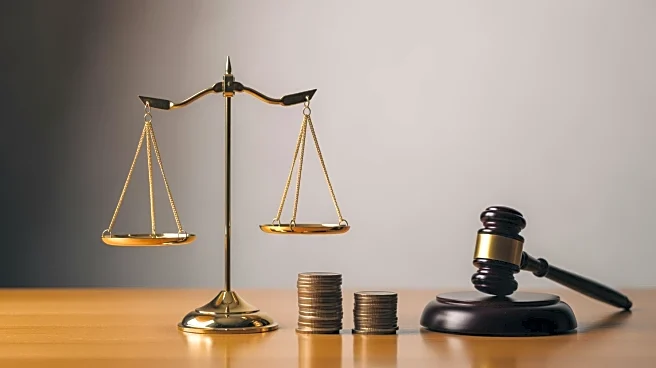What's Happening?
The Supreme Court is set to hear arguments regarding President Trump's authority to impose tariffs under the International Emergency Economic Powers Act (IEEPA). This legal challenge questions whether
the tariffs, which have significantly impacted various sectors, exceed the powers granted to the president. The tariffs include a 25% levy on wood imports and derivative products, affecting industries reliant on these materials. The case arises amid President Trump's declining approval ratings concerning his economic policies, which have been a central issue since his election. The outcome of this case could influence the president's control over the Republican Party and impact upcoming midterm elections.
Why It's Important?
The Supreme Court's decision could have far-reaching implications for U.S. trade policy and the economy. If the court rules against President Trump, it may limit the executive branch's ability to unilaterally impose tariffs, potentially stabilizing international trade relations. This could lead to reduced costs for imported goods, benefiting consumers and businesses. Conversely, a ruling in favor of the president might embolden further use of tariffs as a tool for economic and political leverage. The decision will also test the balance of power between the executive and legislative branches, as Congress traditionally holds the authority to regulate commerce.
What's Next?
Should the Supreme Court invalidate the tariffs, President Trump may seek alternative legal avenues to impose them, such as invoking other trade statutes. However, these options may not provide the same broad authority as the IEEPA. The administration might also face pressure to negotiate with Congress for tariff approval, a challenging prospect given the current political climate. The ruling could also influence market stability, as businesses and investors seek clarity on future trade policies. The decision is expected to have a significant impact on President Trump's economic strategy and his political standing.
Beyond the Headlines
The case highlights the ongoing debate over the scope of presidential powers in economic matters. It raises questions about the legal and ethical implications of using tariffs as a political tool. The outcome could set a precedent for future administrations, potentially reshaping the U.S. approach to international trade and economic diplomacy. Additionally, the decision may affect global perceptions of U.S. trade policy, influencing international relations and economic partnerships.









